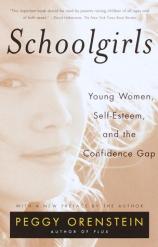Reading Group Guide
Discussion Questions
Schoolgirls

1. How do your experiences of gender biases differ from those your mother faced as a child, or that your daughter faces today? Does your daughter and/or mother deal with gender bias differently than you do? Than you did? What do you think accounts for any such changes or lack thereof?
2. Did you find that you identified with any of the girls in SchoolGirls? How do their experiences resonate with your own memories of growing up and the ways in which you were taught what it meant to be a girl?
3. Judy Logan implemented a number of innovative teaching methods in her class which were designed to heighten women's strengths and accomplishments. For instance, she encouraged students to write and act out monologues about women heroes. Who would you choose as your heroes? Why? Can you come up with any other classroom strategies to eradicate gender bias?
4. Many of the girls in SchoolGirls didn't feel that they had role models at school. How important is the existence of female role models for girls at school? Who were your role models growing up? Were they at your school? Who are the role models for the teenage girls you know? How do you think girls and teachers can go about finding role models at school?
5. Orenstein discusses conflicting messages about their bodies and their sexuality that the girls in her book experience, as they are simultaneously told to be desirable but not to feel desire themselves. How prevalent do you think this message is for girls in our society? In what ways does it manifest itself? How do you think it's possible to change this message?
6. Some of the girls Orenstein interviewed felt that their brothers were treated very differently than they were. If you have a brother, do you feel that your parents treated your brother differently than they did you? How so? Do your parents feel that they treated you differently? How did your parents' relative treatment of you and your brother affect your assessment of your own strengths and weaknesses?
7. All of Orenstein's schoolgirls experienced various forms of negative peer pressure because they were girls. What kind of peer pressure did you experience as an adolescent? How did this influence your behavior then? Now? How do you think your school experiences would have been different if you had attended a single sex school? If you had attended a coed school?
8. During adolescence girls' bodies undergo many changes. With these physical changes often comes insecurity about body image and self worth. How do you feel about your body? What would you like to change about it? How does this differ from the way you felt about it as a teenager? How do the adolescent girls that you know view their bodies? How does this differ from boys' perceptions?
9. Many of the girls in SchoolGirls felt that at one time or another they were harassed by the boys at their schools and in their classes. Did you experience any type of harassment during your teenage years? What happened? What would you advise a teenage girl to do under such circumstances?
10. Do you consider yourself a feminist? Did you as an adolescent? Has your understanding of and attitude toward feminism changed since you were an adolescent? How so? What did you learn about feminism as an adolescent? How did you learn it?
11. A group of seventh grade girls at the University of Chicago Lab School started their own discussion group as a result of reading SchoolGirls. If you were to form a discussion group how would you go about it? What issues would you address? What goals would you set for this group? Have similar groups started in the schools near you?
Schoolgirls
- Publication Date: September 1, 1995
- Paperback: 368 pages
- Publisher: Anchor
- ISBN-10: 0385425767
- ISBN-13: 9780385425766







